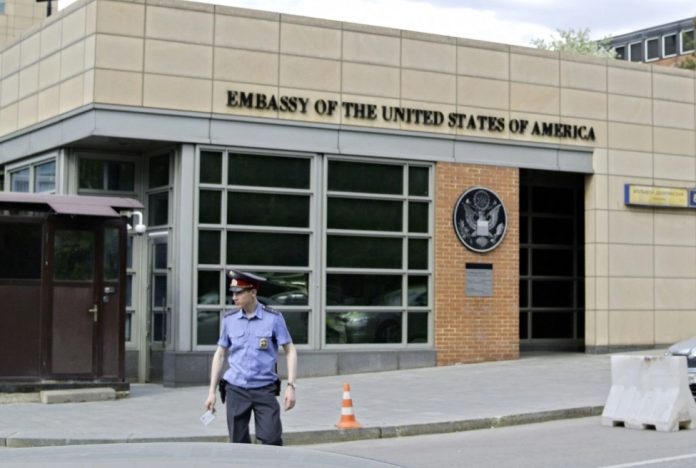
As new details come to light, Congress is demanding more information and more action by the Obama administration in response to the attack last month on a U.S. diplomat by a Russian FSB guard at the Moscow embassy.
One month after the June 6 attack, the Obama administration has refused to comment publicly on the incident, which was first reported in The Washington Post last week. But the Russian foreign ministry has put out a series of statements claiming that an undercover U.S. spy, posing as a diplomat, rushed the gate at the U.S. Embassy in Moscow’s city center and assaulted a Russian guard stationed outside the compound’s walls. State Department spokesman John Kirby said last week the Russian statements were “inaccurate,” but he declined to elaborate.
Kirby did acknowledge that the U.S. government has video of the incident. Two U.S. officials who have seen the video told me that it clearly shows the Russian FSB guard attacking the U.S. diplomat, not the other way around. The officials also said that the diplomat was on embassy compound property when the guard assaulted him. If true, that could mean the Russian guard violated the Vienna Convention on diplomatic relations.
“I don’t think we’ve ever seen anything quite like this,” Senate Select Committee on Intelligence Chairman Richard Burr, R-N.C., told me. “We are intricately involved in all facets of it from an oversight standpoint. We continue to work with the State Department and all interested parties.”
The State Department called in Russian Ambassador Sergey Kislyak to complain about the incident shortly after it happened. But Burr and other U.S. lawmakers briefed on the incident told me that Congress will press the Obama administration to mount a more forceful response.
“Clearly, an incident like this can’t go without some action by the administration,” said Burr.
Administration officials have begun a series of briefings with members of Congress who have been trying to learn more about the incident. One member of Congress who attended one of the briefings described them as “useless” and said the administration officials are still refusing to share details lawmakers seek.
For example, the State Department has declined to confirm that the incident happened on embassy compound property, despite what the video shows. Article 22 of the Vienna Convention states: “The premises of the mission shall be inviolable. The agents of the receiving State may not enter them, except with the consent of the head of the mission.” Article 29 specifies that accredited diplomats are not subject to arrest or detention by host nation law enforcement.
Two U.S. officials told me that the U.S. diplomat was in fact working undercover for the U.S. intelligence community and was seeking refuge inside the U.S. Embassy to avoid being detained by the Russian security services, who had been following him. Russian security services personnel were waiting for him at the embassy guard station, the video shows, according to the officials. He rushed through the guard station and made it onto embassy property, but one FSB guard pursued him into the compound and tackled him to the ground. The diplomat eventually broke free and continued into the embassy building before any other U.S. personnel could come to his aid.
This account, which the State Department declined to confirm, is quite different from the account put forth by the Russian foreign ministry in two separate statements over the past week. On June 30, Russian foreign ministry spokesperson Maria Zakharova said that the diplomat jumped out of a taxi with a cap pulled down over his face and refused to show the Russian guards any credentials before elbowing one guard in the face. She also said the Russian government believed the diplomat to be an undercover CIA agent.
Zakharova accused the U.S. government of leaking the story to deliberately undermine U.S.-Russian relations and said the State Department should simply say thank you to the guard for protecting the embassy. On July 6, Zakharova called the story part of a “targeted information campaign” to smear Russia, and said “a banal event in the life of an ordinary employee of the CIA has been transformed by our American colleagues [into a] Russian police assault on [an] innocent American diplomat.”
Kirby said that the series of comments from the Russian foreign ministry ever since The Post first reported increased harassment of U.S. diplomats by the Russian intelligence services were “factually inaccurate,” adding “Moscow knows that all too well.”
“However, . . . the United States is not interested in having a public debate on the issue,” Kirby said. “We believe that this is best handled in private government-to-government discussions. That’s how we’re going to continue to do this.”
He noted that Secretary of State John Kerry has raised this issue with the Russians at the highest levels. Kerry discussed it with Russian President Vladimir Putin during his March visit to Moscow. Kerry is traveling in Europe this week and will attend the NATO summit in Warsaw. Many in Congress are also pressing the Obama administration to do more about the pattern of harassment and intimidation against U.S. diplomats in Europe.
“The administration is well behind on this,” said Rep. Michael Turner, R-Ohio, who is president of the NATO Parliamentary Assembly. “They’ve been slow to acknowledge it’s even happening.”

